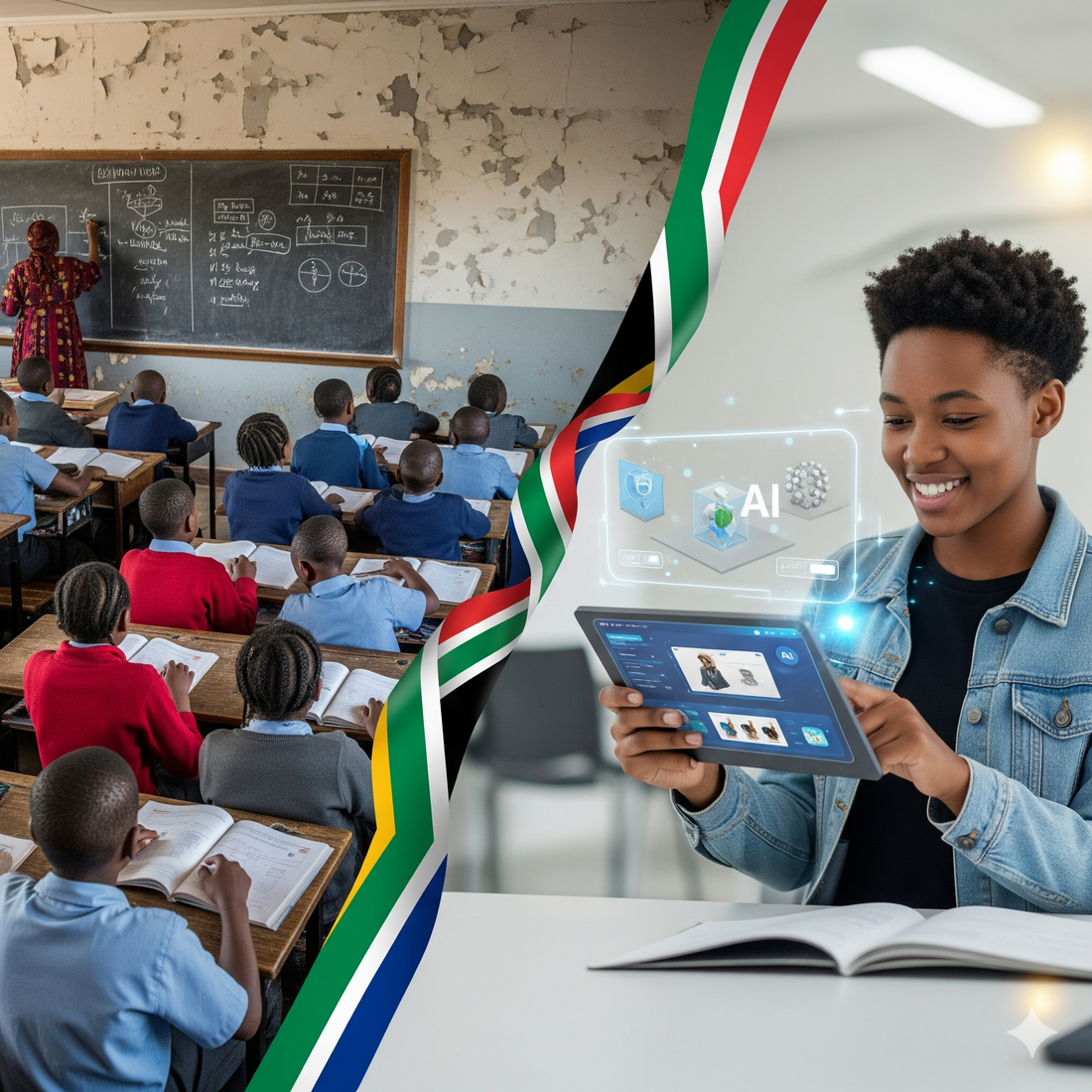
Alpha School's AI Revolution: Could South Africa's Education Crisis Find Its Answer in Two Hours?
What if everything we believed about education was wrong? What if South African students could master mathematics, science, and languages in just two hours daily? While spending the rest of their time building entrepreneurial skills?
MacKenzie Price's Alpha School isn't just disrupting American education. It's rewriting the rulebook entirely.
The Two-Hour Learning Revolution
When Price's daughter complained that school was "boring", most parents would have scheduled a meeting with the teacher. Price built an entirely new education system instead.
The results? Staggering.
Alpha School students learn academics in just two hours daily using personalised AI tutors. Then they spend afternoons mastering life skills—public speaking, entrepreneurship, critical thinking. The academic outcomes speak for themselves: students consistently score in the top 1-2% nationally on standardised tests.
But here's what makes this revolutionary for South Africa.
Why This Matters for South African Youth
Our education system faces unprecedented challenges. Overcrowded classrooms. Teacher skills-shortages. Language barriers. Limited resources.
Alpha School's model directly addresses every single one.
Personalised Learning at Scale Traditional South African classrooms often have 40+ students per teacher - my classroom embraced these numbers more than than two-decades ago! Impossible for personalised attention. Alpha's AI tutors provide 1:1 instruction for every student. No matter the class size.
Each student progresses at their own pace. Struggling with Afrikaans grammar? The AI adjusts. Excelling in mathematics? Advanced concepts unlock automatically. No child gets left behind or held back.
Language Flexibility South Africa's 11 official languages create complex educational challenges. AI tutors can switch between languages instantly. Explain concepts in isiZulu, then test comprehension in English. Seamlessly support multilingual learning.
Critical Skills Development While traditional schools focus on rote memorisation, Alpha students spend afternoons developing entrepreneurial skills. Perfect for South Africa's youth unemployment crisis. Students learn to start businesses, manage finances, solve real-world problems.
One Alpha student manages an Airbnb property. Another built a mental health app. These aren't hypothetical case studies. They're 12-year-olds preparing for economic reality.
The SMME Training Revolution
South African small businesses struggle with skills development. Limited budgets for training. High costs for consultants. Alpha School's approach offers a blueprint for SMME workforce development.
Micro-Learning Excellence Alpha proves complex skills can be mastered in concentrated bursts. SMMEs could adopt similar approaches for staff training. Two hours of focused, AI-assisted learning. Then practical application.
Imagine training restaurant staff using personalised AI modules. Customer service scenarios adapted to South African cultural contexts. Inventory management explained in multiple languages. Costs fraction of traditional training programmes.
Mentorship-Based Support Alpha's "guides" don't teach academics—they provide motivational support. SMMEs could adopt similar models. AI handles technical training. Human mentors focus on emotional intelligence, problem-solving, teamwork.
Measurable Outcomes Alpha tracks every student's progress in real-time. SMMEs could implement similar systems for employee development. Precise measurement of skill acquisition. Immediate feedback on performance gaps.
The Economics of Educational Transformation
Alpha School charges R750,000 annually in some locations. Expensive for individual families. But consider the economics for South African institutions.
Traditional teacher salaries, classroom maintenance, textbook costs add up quickly. Alpha's model requires fewer human resources. Lower infrastructure demands. Scalable across multiple locations.
A single AI tutor can serve hundreds of students simultaneously. Human guides focus on high-value activities—motivation, life skills, emotional support.
For South African youth programmes or SMME training centres, the cost-effectiveness could be transformative.
Addressing the Sceptics
Critics argue AI cannot replace human connection in education. Valid concern. Alpha School agrees completely.
Their model doesn't eliminate humans—it optimises their role. Teachers become motivational coaches. Focusing on what humans do best: inspiration, creativity, emotional intelligence.
The technology handles repetitive instruction. Humans handle transformation.
The South African Opportunity
Imagine University of Cape Town or "Bush Uni" partnering with local tech companies to create Alpha-inspired programmes. Students master core subjects using AI tutors. Afternoons spent on ubuntu philosophy, local entrepreneurship, community problem-solving.
Or Johannesburg SMMEs collaborating on shared training platforms. AI-powered skills development. Human mentors from successful local businesses. Cost-sharing arrangements making world-class training accessible.
The infrastructure exists. South Africa has excellent universities, colleges and technikons, innovative tech companies, entrepreneurial spirit. What's been missing is the educational model to connect them effectively.
Building Tomorrow's Workforce, Today
Alpha School proves personalised AI education isn't science fiction. It's happening now. Students are thriving. Academic excellence and life skills development aren't mutually exclusive.
For South African Youth facing uncertain economic futures, this model offers hope. For SMMEs struggling with skills development, it provides practical solutions.
The question isn't whether AI will transform education. It's whether South Africa will lead or follow the revolution.
Time to stop accepting educational mediocrity as inevitable. Time to imagine what's possible when technology serves human potential instead of replacing it.
The future of learning is personal, practical, and powerful. It starts with believing our young people deserve better than boring classrooms and outdated methods.
They deserve education that prepares them not just for tests, but for life.
